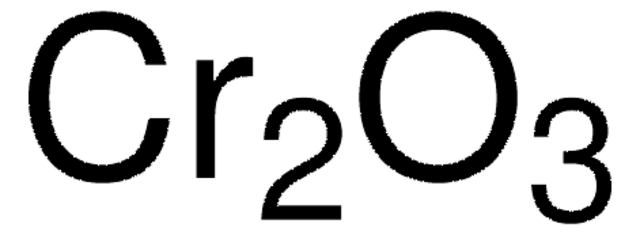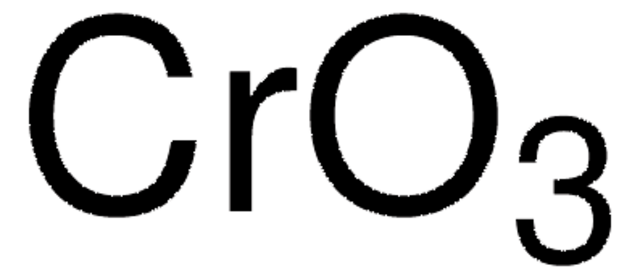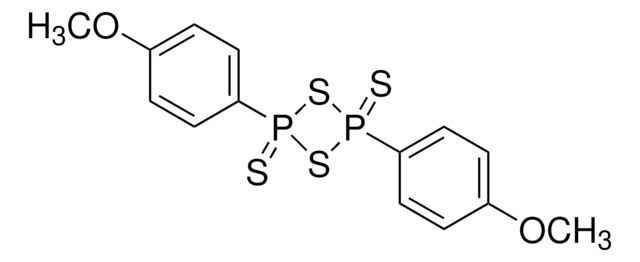634239
Chromium(III) oxide
nanopowder, <100 nm particle size (TEM), 98% trace metals basis
Sinónimos:
Chromia
Iniciar sesiónpara Ver la Fijación de precios por contrato y de la organización
About This Item
Fórmula empírica (notación de Hill):
Cr2O3
Número de CAS:
Peso molecular:
151.99
EC Number:
MDL number:
UNSPSC Code:
12352302
PubChem Substance ID:
NACRES:
NA.23
Productos recomendados
Quality Level
assay
98% trace metals basis
form
nanopowder
particle size
<100 nm (TEM)
SMILES string
O=[Cr]O[Cr]=O
InChI
1S/2Cr.3O
InChI key
QDOXWKRWXJOMAK-UHFFFAOYSA-N
¿Está buscando productos similares? Visita Guía de comparación de productos
Application
Used in a solid-state reaction to form the new ternary oxide, CrVMoO7, can be used in selective oxidation.
Storage Class
11 - Combustible Solids
wgk_germany
nwg
flash_point_f
Not applicable
flash_point_c
Not applicable
ppe
Eyeshields, Gloves, type N95 (US)
Elija entre una de las versiones más recientes:
¿Ya tiene este producto?
Encuentre la documentación para los productos que ha comprado recientemente en la Biblioteca de documentos.
Los clientes también vieron
In vitro macrophage response to nanometer-size chromium oxide particles
VanOs R, et al.
Journal of Biomedical Materials Research. Part B, Applied Biomaterials, 102(1), 149-159 (2014)
Nien-Hsun Li et al.
Journal of hazardous materials, 198, 356-361 (2011-11-15)
The feasibility of stabilizing nickel-laden sludge by a high-temperature NiCr(2)O(4) synthesis process was investigated with different sintering temperatures, salt contents, molar ratios, and reaction atmospheres. The crystalline phases of species were investigated by using an X-ray diffraction, and the surface
S E Dutton et al.
Journal of physics. Condensed matter : an Institute of Physics journal, 23(24), 246005-246005 (2011-06-01)
α-SrCr(2)O(4) has a triangular planar lattice of d(3) Cr(3+) made from edge sharing CrO(6) octahedra; the plane shows a very small orthorhombic distortion from hexagonal symmetry. With a Weiss temperature of - 596 K and a three-dimensional magnetic ordering temperature
Selvam Sangeetha et al.
Colloids and surfaces. B, Biointerfaces, 100, 36-41 (2012-07-07)
Stabilization of collagen for various applications employs chemicals such as aldehydes, metal ions, polyphenols, etc. Stability against enzymatic, thermal and mechanical degradation is required for a range of biomedical applications. The premise of this research is to explore the use
Małgorzata Wiśniewska et al.
Environmental science and pollution research international, 20(6), 3657-3669 (2012-11-07)
The lack of water is the most serious threat to humanity that leads to more efficient water and sewage treatment. Currently, many scientists are looking for new coagulants, flocculants and physicochemical methods allowing for sufficient removal of pollutants from water.
Nuestro equipo de científicos tiene experiencia en todas las áreas de investigación: Ciencias de la vida, Ciencia de los materiales, Síntesis química, Cromatografía, Analítica y muchas otras.
Póngase en contacto con el Servicio técnico











